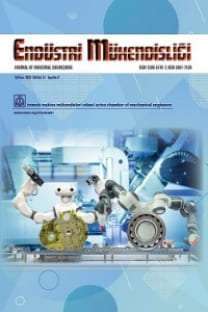PLASTİK ENJEKSİYON MAKİNELERİNİN VARDİYA BAZINDA ÇİZELGELENMESİ PROBLEMİ İÇİN BİR HEDEF PROGRAMLAMA MODELİ
Bu çalışmada, plastik parça üreten bir fabrikanın üretim tesislerinde sıra bağımlı hazırlık süreli bir özdeş paralel makine çizelgeleme problemi ele alınmıştır. Problemin amaçları, son işin tamamlanma zamanının ve toplam gecikmenin enküçüklenmesidir. Çok amaçlı yapıda olan ve sürece özel kısıtlar içeren problem için bir hedef programlama modeli geliştirilmiştir. Geliştirilen model hem küçük boyutlu bir problem hem de bir gerçek hayat problemi kullanılarak test edilmiştir. Bu problemlerin çözümünde GAMS/Cplex çözücüsü kullanılmıştır. Elde edilen çizelge işletmenin çizelgesiyle karşılaştırılmıştır.
Anahtar Kelimeler:
Özdeş paralel makine çizelgeleme, sıra bağımlı hazırlık süresi, hedef programlama
A GOAL PROGRAMMING MODEL FOR SHIFT-BASED SCHEDULING PROBLEM OF PLASTIC INJECTION MACHINES
In this study, an identical parallel machine scheduling problem with sequence dependent setup times is considered at a plastic product manufacturing plant. The objectives of the problem are to minimize makespan and total tardiness. A goal programming model is developed for this multi-objective problem which includes special process constraints. The developed model is tested using both a small sized instance and a real life problem. GAMS/Cplex solver is used for solving these problems. Obtained schedule compared with the company’s own schedule.
___
- 1. Heady, R.B., Zhu, Z., 1998. Minimizing the Sum of Job Earliness and Tardiness in a Multimachine System. International Journal of Production Research 36, 1619-1632.
- 2. Balakrishnan, N., Kanet, J. J., Sridharan, S. V., 1999. Early/tardy Scheduling with Sequence Dependent Setups on Uniform Paralel Machines. Computers and Operations Research 26, 127-141.
- 3. Sivrikaya – Serifoglu, F., Ulusoy, G., 1999. Parallel Machine Scheduling with Earliness and Tardiness Penalties. Computers and Operations Research 26, 773-787.
- 4. Vignier , A., Sonntag, B., Portmann, M. C., 1999. Hybrid Method for a Parallel Machine Scheduling Problem. IEEE Symposium on Emerging Technologies and Factory Automation, ETFA 1, 671-678.
- 5. Park, Y., Kim, S., Lee, Y. H., 2000. Scheduling Jobs on Parallel Machines Applying Neural Network and Heuristic rules. Computers and Industrial Engineering 38, 189-202.
- 6. Radhakrishnan, S., Ventura, J. A., 2000. Simulated Annealing for Parallel Machine Scheduling with Earliness - tardiness Penalties and Sequence – Dependent Set – Up Times. International Journal of Production Research 38, 2233-2252.
- 7. Zhu, Z., Heady, R. B., 2000. Minimizing the Sum of Earliness/tardiness in Multi Machine Scheduling : A Mixed Integer Programming Approach. Computers and Industrial Engineering 38, 297-305.
- 8. Gendreau, M., Laporte, G., Guimaraes, E. M., 2001. A Divide and Merge Heuristic for the Multiprocessor Scheduling Problem with Sequence Dependent Setup Times. European Journal of Production Research 133, 183-189.
- 9. Kurz, M.E., Askin, R.G., 2001. Heuristic Scheduling of Parallel Machines with Sequence – Dependent Set – Up Times. International Journal of Production Research 39, 3747-3769.
- 10. Pinedo, M., 2002. Scheduling: Theory, Algorithms and Systems. 2nd Ed., Prentice Hall, 568p.
- 11. Tahar, D.N., Yalaoui, F., Chu, C., Amadeo, L., 2006. A Linear Programming Approach for Identical Parallel Machine Scheduling with Job Splitting and Sequence Dependent Setup Times. International Journal of Production Economics 99, 63-73.
- 12. Saraç, T., 2007, Genelleştirilmiş Karesel Çoklu Sırt Çantası Problemi İçin Melez Bir Çözüm Yaklaşımı, Doktora Tezi, Eskişehir Osmangazi Ü. Fen Bil. Ens., s.90 – 108.
- 13. Allahverdi, A. 2008. A Survey of Scheduling Problems with Setup Times or Costs. European Journal of Operational Research 187, 985-1032.
- 14. Gharehgozli, A. H., Tavakkoli – Moghaddam, R. Zaerpour, N. 2008. A Fuzzy – Mixed Integer Goal Programming Model for a Parallel – machine Scheduling Problem with Sequence – Dependent Setup Times and Release Dates.
- 15. Toksari, M. D., Guner. E., 2009. Parallel Machine Scheduling Problem to Minimize the Earliness/tardiness Costs with Learning Effect and Deteriorating Jobs.
- ISSN: 1300-3410
- Yayın Aralığı: Yılda 3 Sayı
- Başlangıç: 1989
- Yayıncı: TMMOB MAKİNA MÜHENDİSLERİ ODASI
